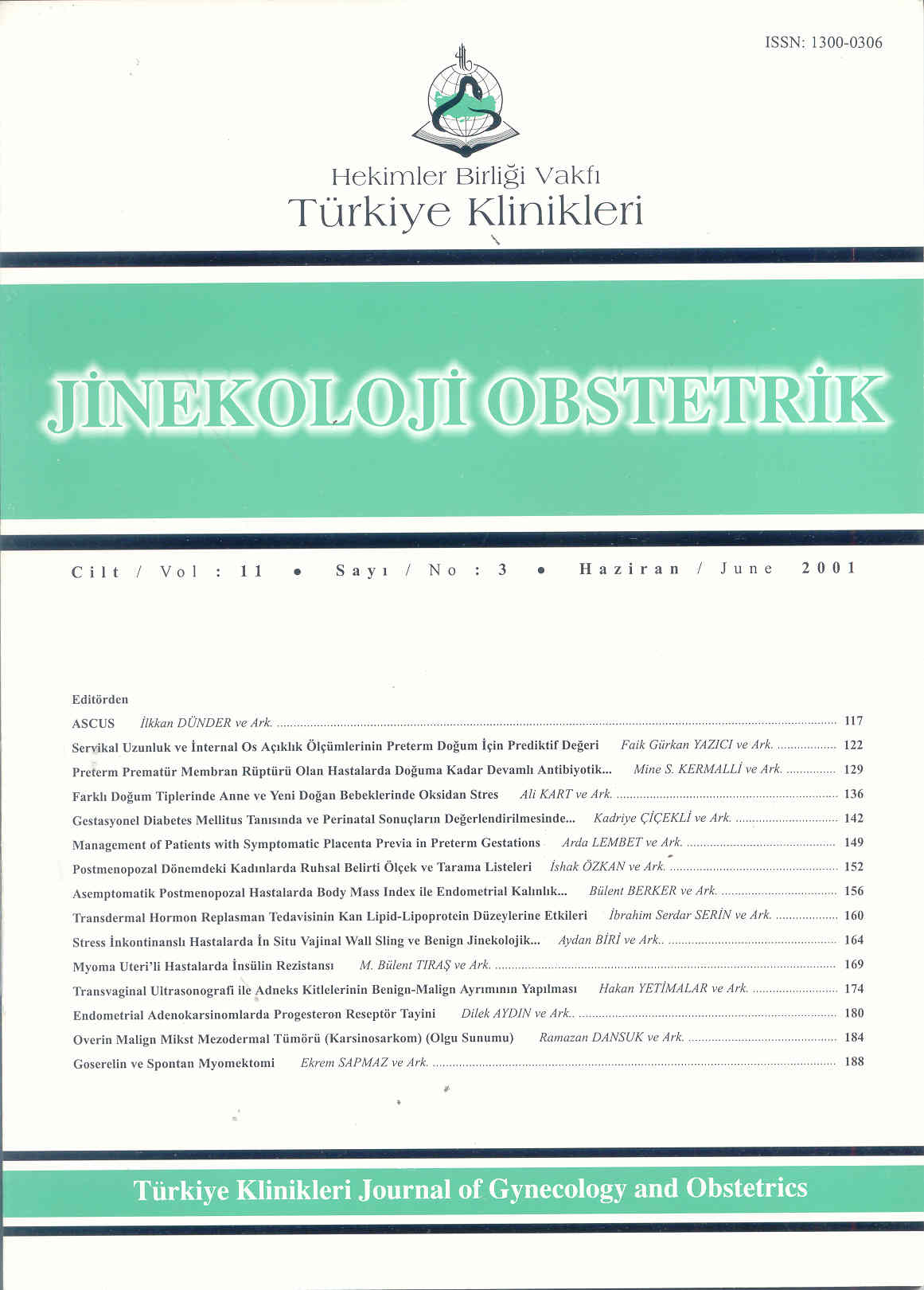Open Access
Peer Reviewed
ARTICLES
5472 Viewed2446 Downloaded
ASCUS-Atypical Squamous Cells Of Undetermined Significance
ASCUS
Turkiye Klinikleri J Gynecol Obst. 2001;11(3):117-21
Article Language: TR
Copyright Ⓒ 2025 by Türkiye Klinikleri. This is an open access article under the CC BY-NC-ND license (http://creativecommons.org/licenses/by-nc-nd/4.0/)
ÖZET
Amaç: ASCUS (atypical squamous cells of undetermined significance) tanımının histolojik korelasyonunu belirlemek ve ASCUS tanısı alan kadınlarda yaklaşım konusuna açıklık getirmek. Data özelliği: ASCUSla ilgili makaleler gözden geçirildi. Tüm çalışmalar İngilizce MEDLINE taramasıyla elde edildi. Çalışma seçimi: ASCUS tanısının konulabilmesi için kriterler belirleyen, yaklaşım konusuna açıklık getiren çalışmalar seçildi. Sonuçlar: Spesifik patoloji tanımlamayan bir terim olan ASCUS %10-60 oranında squamoz intraepitelyal lezyon (SIL) ile birliktelik göstermektedir. Dolayısıyla iki yıl süreyle altı ay aralıklarla sitolojik takip yapılmalıdır. Hastalar high grade SIL, persistans veya tekrarlayıcı ASCUS gösterirlerse kolposkopi yapılmalıdır. Yüksek riskli hastalara hemen kolposkopi önerilmelidir. HPV DNA testi yapılması da takibi yönlendirecektir. Karar: Bethesda sistemi Pap smear tanısının kalitesini ve aynı zamanda anormal Pap smearli hasta sayısını arttırmıştır. Ancak bunun kanseri önleme ve tedavi etmedeki etkinliği tartışmalıdır.
Amaç: ASCUS (atypical squamous cells of undetermined significance) tanımının histolojik korelasyonunu belirlemek ve ASCUS tanısı alan kadınlarda yaklaşım konusuna açıklık getirmek. Data özelliği: ASCUSla ilgili makaleler gözden geçirildi. Tüm çalışmalar İngilizce MEDLINE taramasıyla elde edildi. Çalışma seçimi: ASCUS tanısının konulabilmesi için kriterler belirleyen, yaklaşım konusuna açıklık getiren çalışmalar seçildi. Sonuçlar: Spesifik patoloji tanımlamayan bir terim olan ASCUS %10-60 oranında squamoz intraepitelyal lezyon (SIL) ile birliktelik göstermektedir. Dolayısıyla iki yıl süreyle altı ay aralıklarla sitolojik takip yapılmalıdır. Hastalar high grade SIL, persistans veya tekrarlayıcı ASCUS gösterirlerse kolposkopi yapılmalıdır. Yüksek riskli hastalara hemen kolposkopi önerilmelidir. HPV DNA testi yapılması da takibi yönlendirecektir. Karar: Bethesda sistemi Pap smear tanısının kalitesini ve aynı zamanda anormal Pap smearli hasta sayısını arttırmıştır. Ancak bunun kanseri önleme ve tedavi etmedeki etkinliği tartışmalıdır.
ANAHTAR KELİMELER: ASCUS, Bethesda
ABSTRACT
Objective: To determine the hystologic correlation of ASCUS definition and evaluate the management of ASCUS. Data identification: Related literature was reviewed. All studies were obtained through English MEDLINE searches. Study selection: The articles that determine the diagnostic criteria and issue of management for ASCUS were selected. Results: ASCUS that doesnt define a spesific pathology is associated with squamous intraepithelial lesion in %10-60 of cases. Therefore cytology must be performed every 6 months for 2 years. If high grade SIL, persistance or recurrence are seen, colposcopy is needed. In high risk patients colposcopy must be done immediately. HPV DNA test will be adjunctive to the follow up. Conclusion: Bethesda system has increased both the quality of Pap smear test and the number of abnormal Pap smear results. But, the efficacy of this in cancer prevention and treatment is contraversial.
Objective: To determine the hystologic correlation of ASCUS definition and evaluate the management of ASCUS. Data identification: Related literature was reviewed. All studies were obtained through English MEDLINE searches. Study selection: The articles that determine the diagnostic criteria and issue of management for ASCUS were selected. Results: ASCUS that doesnt define a spesific pathology is associated with squamous intraepithelial lesion in %10-60 of cases. Therefore cytology must be performed every 6 months for 2 years. If high grade SIL, persistance or recurrence are seen, colposcopy is needed. In high risk patients colposcopy must be done immediately. HPV DNA test will be adjunctive to the follow up. Conclusion: Bethesda system has increased both the quality of Pap smear test and the number of abnormal Pap smear results. But, the efficacy of this in cancer prevention and treatment is contraversial.
MENU
POPULAR ARTICLES
MOST DOWNLOADED ARTICLES





This journal is licensed under a Creative Commons Attribution-NonCommercial-NoDerivatives 4.0 International License.










